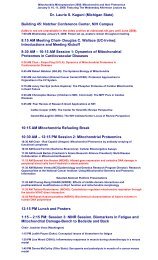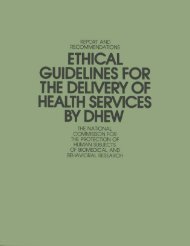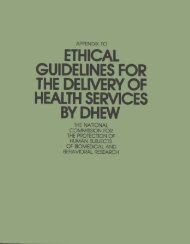RESEARCH ON THE FETUS - National Institutes of Health
RESEARCH ON THE FETUS - National Institutes of Health
RESEARCH ON THE FETUS - National Institutes of Health
You also want an ePaper? Increase the reach of your titles
YUMPU automatically turns print PDFs into web optimized ePapers that Google loves.
7. Robert Greenberg, M.D. (Society for Pediatric Research and the<br />
American Pediatric Society). Dr. Greenberg presented statistics on the high<br />
rates <strong>of</strong> infant mortality and abnormal fetal development as indicators that the<br />
current health status <strong>of</strong> the fetus is poor. Dr. Greenberg stated that genuine<br />
concern for the fetus requires marked improvement <strong>of</strong> the health care available<br />
to the developing human during intrauterine life. Such improvements in health<br />
care require acquisition <strong>of</strong> further understanding through increased research.<br />
8. Sumner Yaffe, M.D. (American Academy <strong>of</strong> Pediatrics). Dr. Yaffe cited<br />
numerous advances in fetal therapeutics resulting from research on the fetus and<br />
emphasized the acute need for more extensive research in fetal clinical pharmacology.<br />
He presented the Academy's code <strong>of</strong> ethics for research involving the<br />
fetus and fetal material. The code states that research intended to benefit the<br />
mother or fetus in utero may be conducted with informed consent; that research<br />
on the viable delivered fetus (premature infant) may be carried out as long as<br />
nothing is done that is inconsistent with treatment necessary to promote the<br />
life <strong>of</strong> the infant; and that research on the nonviable fetus before or after<br />
abortion should be permitted, providing appropriate animal studies have been<br />
completed, parental consent is obtained, the researchers have no part in deciding<br />
timing or procedures for terminating the pregnancy or in determining viability,<br />
the research has been approved by an Institutional Review Board which is satisfied<br />
that the information cannot be obtained in any other way, experiments are<br />
not done in the delivery room, there is no monetary exchange for fetal material,<br />
and full records are kept.<br />
9. Lois Schiffer (Women's Equity Action League, Women's Legal Defense<br />
Fund, Human Rights for Women). Ms. Schiffer cautioned against developing a policy<br />
that would abrogate constitutionally protected interests, such as the preeminence<br />
<strong>of</strong> a pregnant woman's right to health care. She underscored the need<br />
for continuing research in order to provide pregnant women with optimum medical<br />
advice and treatment (including improved abortion techniques). She suggested,<br />
additionally, that a requirement <strong>of</strong> paternal or spousal consent in conjunction<br />
with research on the fetus would contravene the holdings in the Roe and Doe decisions<br />
and that such consent serves no legitimate purpose if no child will be born.<br />
43











